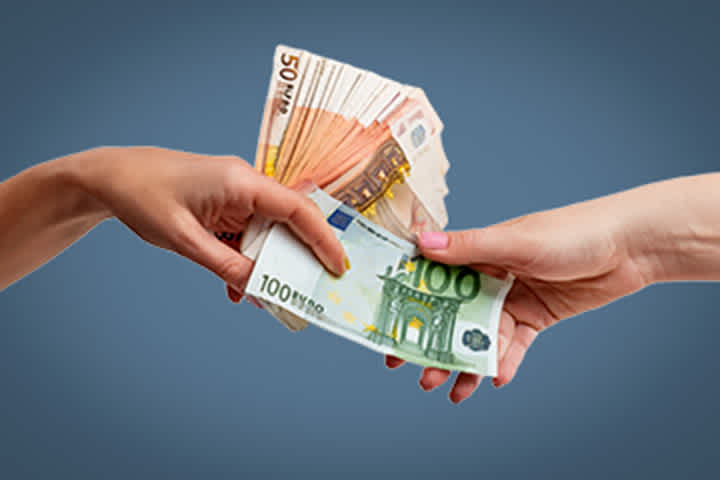On the way to a society without cash?
Keytrade Bank
keytradebank.be
March 27, 2019
6 minutes to read
In Uppsala's 13th-century cathedral, worshippers can donate Swedish crowns as they used to do during the stoeltjesgeld (chair money) collection. No coins with you? No problem. For some years now, churchgoers have also been able to use their bank card there. Because in one of the most cashless countries in the world, even God accepts collections via smartphones and payment cards.
The Scandinavian countries and Iceland are therefore international leaders in electronic payments. In Europe they are followed, at a great distance, by countries such as the Netherlands and Estonia. "Belgium is somewhere in the middle. In 20% of Belgian businesses, you can still only pay with cash," says Professor Leo Van Hove (VUB), who specialises in payment systems. "According to the latest figures (2017), every Belgian pays by card an average of 166 times a year. That is less than the Swedes (331), the Dutch (250) and the French (185). However, we are better than the Germans (54) and the Italians (46)."
Will the day come when we say goodbye to cash for good?
"Cashless societies have been talked about since the 1970s," says Prof. Van Hove. "If a cashless society for you means that you can pay electronically everywhere, then we are moving in that direction. If you mean that cash will disappear completely, then that won't happen any time soon. As long as central banks are still printing money, people will continue to use cash."
Why do we still use cash in places where you can easily and safely pay electronically?
"It's a matter of habits. In surveys in the Netherlands, many respondents indicated that paying by card was their favourite payment method. But if you look at their effective payment behaviour, they used cash more often than a card," says Professor Leo Van Hove.
A few years ago, a PhD student did an experiment on this subject in the "Vrije Universiteit Brussel" (VUB) campus restaurant. "The researcher hung posters at the cash registers calling for electronic payment 'for the safety of staff'. After a few weeks the student removed the posters. What happened? During the research, the students had not changed their payment behaviour and the campus staff had only changed a little. Two weeks later the effect had even disappeared."
Besides customs, there are also misunderstandings that play a role. "People still often think that shops prefer cash for small payments because of the costs," Professor Leo Van Hove comments. "Until recently, traders were also allowed to charge a transaction fee; this is no longer the case. However, many consumers still think that the trader would rather have cash for small payments."
A society without cash: what benefits can this have?
"An electronic payment leaves traces. Less cash means that you can close a lot of loopholes in terms of undeclared work and fraud. And the less cash in circulation, the lower the risk of burglaries, robberies, bank robberies, burglaries, thefts, etc."
"However, the greatest benefit is of course the cost to society. According to research by the ECB, we pay a very high price for cash: no less than 129 euros per person per year. There are design costs, material costs, printing costs, costs for secure transport and supervised storage, security and handling costs for bank branches, infrastructural costs (from printing presses to distribution machines) and so on," lists Professor Leo Van Hove. "These costs are quite invisible to us, but they are there. If you have to pay for a cash withdrawal, it will create resistance among the people. While such a cost is quite defensible."
"Of course, electronic payments are not free either. You need terminals, servers, networks, security and electricity, among other things. But the cost per transaction is much lower. The more electronic transactions, the lighter the social burden of cash becomes. With every electronic payment, you are helping society a bit," laughs Prof. Van Hove.
Completely abolishing cash: would this have disadvantages?
"Although there are very few people without an account or payment card today, they do exist. There are also people who have a card but do not use it. If you evolve towards a cashless society, the argument is sometimes that you are putting those people in trouble. I do not think that is an ambitious vision. You can open an account today with a corresponding debit card for just a small amount (or even for free). So I think it's better to turn the argument around: should you keep the entire cash system alive for such a small group? I don't think so, personally. Education and raising awareness – by the government and/or the banks – can be the solution. Because no matter how you turn it around, in the future consumers will be able to find fewer and fewer places with cash. And then people who are not able to use an electronic means of payment will be in trouble anyway."
"An important point of attention is, of course, the need for regulation. As a consumer, you may not want companies to be able to sell your payment data (and therefore your consumption pattern) to each other," continues Professor Leo Van Hove. "Another disadvantage of a cashless society is that you must be able to rely 100% on a high-performance network and energy supplies. If the network fails, payments can be stored locally for a while, but such situations quickly become untenable."
Will we all be paying with a fingerprint in 20 years' time?
"Whether we pay with a fingerprint, an iris scan, a chip in our hand, a smartwatch or smartphone, a ring, etc., depends on what will be socially accepted. In principle, you can pack any gadget as a payment key. The easiest thing is of course if you don't need a gadget, but if your own body is your unique payment key," continues Professor Van Hove. "New payment methods often lead to a chicken and egg problem. Consumers do not use it if traders do not accept it. And, likewise, traders do not offer it if consumers do not ask for it. Unfortunately, this slows down technological developments."
"In any case, the general tenor is that payments will become less and less visible. In the future you will also be able to drive out of the supermarket with your trolley without passing through a cash register. Amazon opened such a supermarket in 2016 where you don't have to go through a cash register or self-scan. You just scan your smartphone when you enter the supermarket, and you're done."
Is the trend towards less cash changing our consumption pattern?
"Yes. Research showed that people with a payment card are prepared to spend more than with cash. This is mainly because paying with a card feels 'less painful' than handing over the physical coins and notes," concludes Professor Leo Van Hove. "On the other hand, there are also ever smarter technologies to better monitor your spending pattern. These are not entirely flawless today, but they do have the potential to give people a better overview of their budget management."


